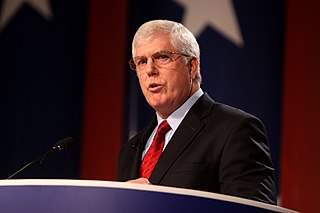A Quote by Ron Paul
We don't have the freedom of speech to talk about the weather. We have the first amendment so we can say some very controversial things.
Related Quotes
Because of the free speech clause in the First Amendment, which is very clear, "The government shall make no law abridging freedom of speech," and it literally is about political speech. You can say anything you want about politics, a candidate, and the government cannot stop you. And the Democrats hate that.
The Framers of the First Amendment were not concerned with preventing government from abridging their freedom to speak about crops and cockfighting, or with protecting the expressive activity of topless dancers, which of late has found some shelter under the First Amendment. Rather, the Framers cherished unabridged freedom of political communication.
The First Amendment of the US Constitution ... is an eloquent repudiation of the First Commandment's prohibition of religious freedom. It is also a repudiation of the Third Commandment's prohibition of freedom of speech. The Thirteenth Amendment repudiates the institution of slavery which is so cozily assumed by the Fourth and Tenth Protestant Commandments.
The First Amendment's language leaves no room for inference that abridgments of speech and press can be made just because they are slight. That Amendment provides, in simple words, that "Congress shall make no law . . . abridging the freedom of speech, or of the press." I read "no law . . . abridging" to mean no law abridging.
Religion should be subject to commonsense appraisal and rational review, as openly discussible as, say, politics, art and the weather. The First Amendment, we should recall, forbids Congress both from establishing laws designating a state religion and from abridging freedom of speech. There is no reason why we should shy away from speaking freely about religion, no reason why it should be thought impolite to debate it, especially when, as so often happens, religious folk bring it up on their own and try to impose it on others.
The First Amendment is really at the very core of political speech, and political speech is at the core of the First Amendment. So, we want to be very careful to make sure that candidates for office are free to express their views so that people will make an informed choice. We don't want them holding back, and sort of concealing their views and then disclosing them afterwards.
In other words, you're taking away your freedom of speech. And they [ministers and priests] started telling me about the Johnson Amendment which really was the first time - and I started studying .And we had a meeting a month later and I said, "We're gonna get rid of the Johnson Amendment because they're stopping you and our great people from talking."
In fact, it's the greatest threat to liberty of all kinds, whether it is freedom of religion, whether it is freedom of speech, whether it is freedom of the press, whether it is freedom of association, all of the rights that are enshrined in the First Amendment are threatened by the active, aggressive homosexual lobby and the homosexual agenda.


































